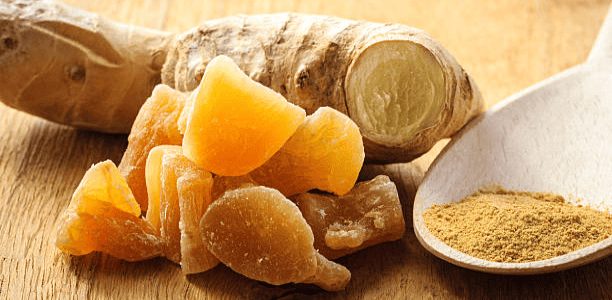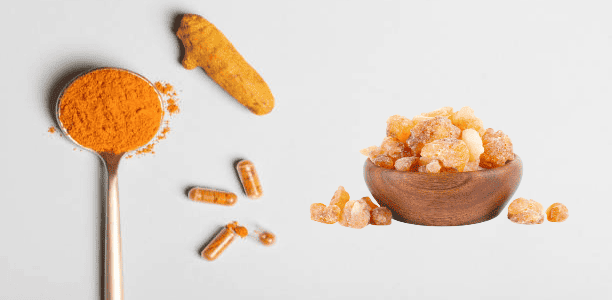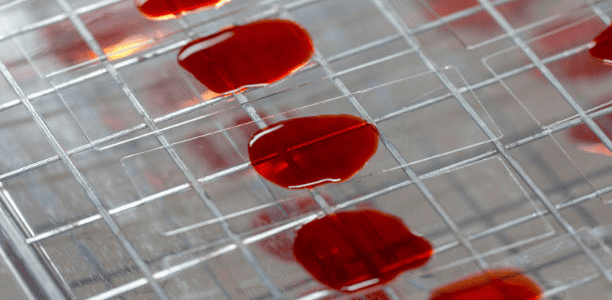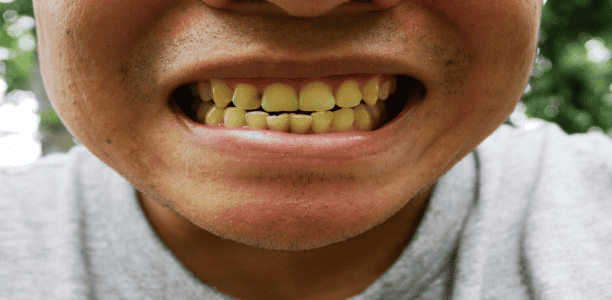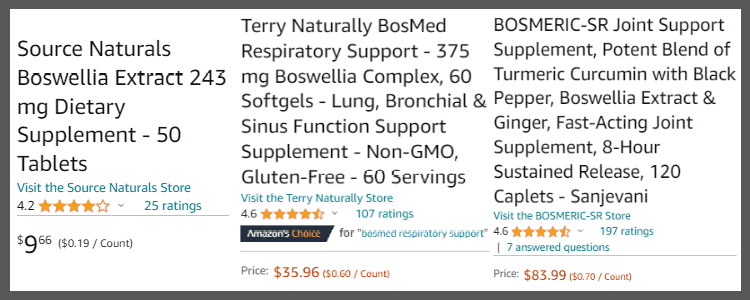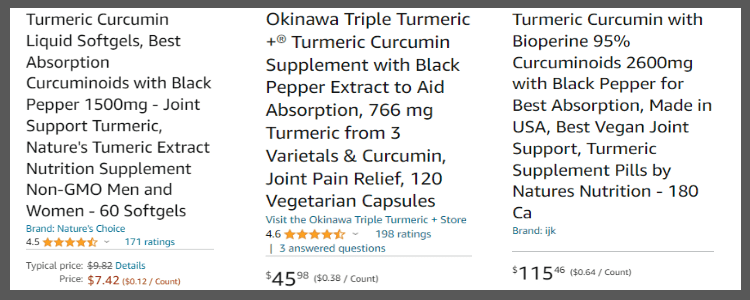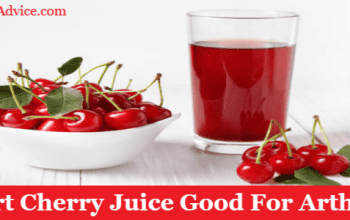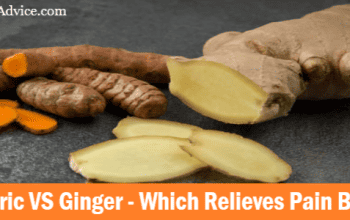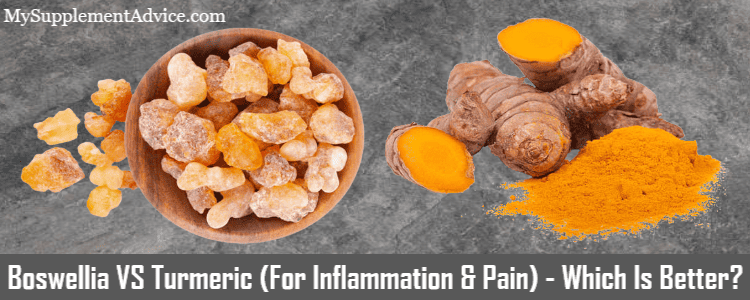
In this article, let's compare Boswellia VS Turmeric.
Which one works better for pain and inflammation?
As we all know, those problems can greatly impact our quality of life.
With that – we're going to discuss the following aspects about Boswellia and Turmeric:
- Which is more potent?
- What are their benefits?
- How do they work individually?
In that way, you will be guided in choosing the herb that will suit your need.
So if you want a detailed comparison, you're in the right place.
Note: This article includes references and studies on these 2 herbs.
Boswellia VS Turmeric? (In A Nutshell)
After comparing the two herbs, I would say turmeric is slightly better than Boswellia.
But the difference between them is not that significant.
Again – turmeric tops in only 2 aspects, which is its price and effect.
It only means that it's more accessible, budget-friendly and a bit stronger.
Not to mention that it has more product options than Boswellia.
Now – the rest of the features of these plants are at similar levels:
- both of them inhibit the enzymes that cause inflammation
- they are safe for consumption
- most of their benefits are related to inflammation and pain
- their adverse reactions are very rare
- both need an enhancer, since they have poor absorption
Again – they only differ in the specific types of enzymes they block.
But in terms of results, both provide amazing benefits for inflammation, pain and related symptoms.
So can you take them at the same time?
Well – yes, since they are herbal remedies and their interactions are not a big issue.
With that, let me give you a very convenient and high-quality option.
Actually – it's my #1 recommendation and it's called Turmeric Curcumin Plus.
It has superior qualities to its similar supplements and it also contains a very high dose of turmeric.
In this way, you can get the same benefits as if you took both turmeric and Boswellia together.
So it's easier for you to incorporate them into your routine.
#1 – Potency & Strength – WINNER: Turmeric
Firstly – we're going to talk about an important factor, which is potency and strength.
In this way, we can find out which herb can address pain and inflammation better.
Here's what we're going to be looking at:
- origin and physical features
- effects and potency
To give you a quick answer, both plants are pretty strong at this chapter.
They only differ in the 2 main aspects:
- how they target the reduction of inflammation
- their plant family and physical features
All in all, turmeric's anti-inflammatory effect is a bit above Boswellia's. Still, the difference isn't huge.
So with that – let's describe each herb further below.
1. Boswellia
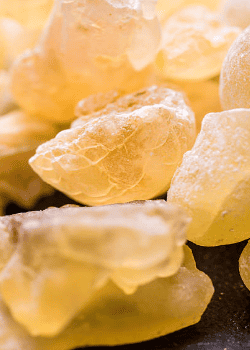
- its common name is Indian Frankincense
- Boswellia serrata is its scientific name
- has yellowish or amber-colored resin
- its plant family is called Burseraceae
- it has been used as a traditional medicine for centuries
Now – the main active compound of Boswellia is called boswellic acid.
It's a pentacyclic triterpene that exhibits strong anti-inflammatory activities [1].
To be exact, it inhibits inflammatory cytokines and enzymes like 5-lipoxygenase [2].
In that way, it can stop the synthesis of leukotriene, which is an inflammatory mediator.
Consequently, this reduces pain and inflammation.
So that's why it's been considered one of the remedies for inflammatory issues.
2. Turmeric
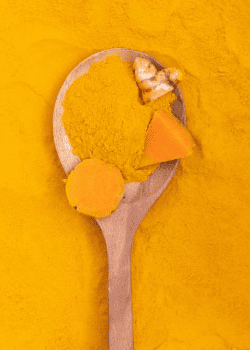
- it's commonly known as golden ginger
- Curcuma longa is its scientific name
- it has a bright yellow pigment
- Zingiberaceae is its plant family
- ancient people discovered its medicinal benefits and used it for years
Additionally – turmeric's active component is called curcumin [3].
Just like boswellic acid, it has anti-inflammatory benefits too.
It works by modulating the response of the immune system.
Also – it reduces the levels of enzymes and cytokines that cause inflammation [4].
The most notable enzymes are the iNOS, COX-2 and LOX.
After blocking them, it reduces inflammation, pain and other related symptoms.
At this point, it's probably the #1 natural anti-inflammatory among herbs (Boswellia is probably #2).
With that – a lot of people consider its promising benefits very helpful.
Conclusion
Overall – both Boswellia and turmeric are known for their anti-inflammatory properties.
The only differences are their main active compound and the enzymes they inhibit.
But their effects are the same when it comes to relieving pain and inflammation.
Sure enough – turmeric is a bit stronger, but not a lot more.
#2 – Clinical Studies & Research – DRAW
For the next part, let's look into the clinical studies and research behind Boswellia and turmeric.
To be exact, here are what we're going to talk about:
- the benefits of each plant
- types of inflammation they can help
- how to use them at their full potential
As I mentioned previously, both herbs target inflammation and pain.
But Boswellia and turmeric have both been subjected to several studies.
So even if they inhibit different enzymes, they can still produce similar relief.
However – the research also concluded that both of them have a poor bioavailability.
With that, it's crucial to take them with an absorption booster to maximize their effects.
1. Boswellia
As we all know, Boswellia has a lot of benefits for the body.
But there are some major reasons why it's so widely used:
- decreases joint pain and arthritis [5]
- improves digestive problems such as IBD [6]
- supports a better respiratory health [7]
- helps repair photodamaged and age-related skin issues [8]
- provides anti-cancer properties [9]
Additionally – most of these health problems are related to inflammation.
As I've mentioned, boswellic acid has anti-inflammatory properties.
So it's practical to seek help from Boswellia to relieve the symptoms related to them.
However – it's important to consider using an absorption enhancer.
That's because Boswellia has a very low bioavailability [10].
This means that it's metabolized before it can even reach your stomach and small intestines.
So if you want to maximize its benefits, choose a product that comes with a booster (like piperine).
That especially if you opt to take Boswellia as capsules.
2. Turmeric
As expected – turmeric also comes with major benefits comparable to that of Boswellia.
So let me list down the most notable effects of this herb:
- manages joint pain and swelling [11]
- suppresses allergic inflammation [12]
- reduces digestive inflammation [13]
- improves insulin resistance [14]
- targets inflammatory acne [15]
Again – these issues are rooted in inflammation and immune response.
But the symptoms can be lessened due to the anti-inflammatory properties of turmeric.
It's because of how curcumin can inhibit the mediators that promote inflammation.
Now – just like Boswellia, turmeric also has a poor bioavailability [16].
So an absorption booster like piperine will help it reach the small intestines and stomach.
In that way – you can get its full concentration, so you can get its full potential.
Conclusion
To sum it up, the major benefits of Boswellia and turmeric are related to inflammation.
If you look at the research about them, you can see lots of similarities.
But you should remember that they have a poor bioavailability.
So if you want to get their full potential, always partner them with an absorption enhancer.
#3 – Side Effects – DRAW
As we all know, most of the herbs are not free from adverse reactions.
So Boswellia and turmeric are no exemption to that.
With that, let me explain below why both plants are the same under this category.
1. Boswellia
In another article, I mentioned the potential side effects of Boswellia.
To give you an idea, here are the risks it comes with:
- blood thinning
- stomach discomfort
- acid reflux
- allergic reactions
Now – the last 3 side effects above can be reduced by following some basic precautions.
Some of them include eating a meal before consuming Boswellia.
Also – you can find other alternatives if you're allergic to it.
Lastly, the most common question about Boswellia is related to its blood thinning proprieties.
Well – it doesn't directly affect blood, but it plays a vital role in platelet aggregation [17].
So just make sure to not take it concurrently with anticoagulant medicines.
Additionally, you can always ask your doctor if you have existing health conditions.
Overall – the side effects above rarely appear and can always be avoided by taking it correctly.
2. Turmeric
Let's also talk about turmeric's possible adverse reactions.
But to keep it short, I will just give you some common examples:
- teeth stain
- diarrhea
- allergic reactions
- blood thinning
Again – diarrhea and allergic reactions are pretty easy to avoid.
In terms of blood thinning, it's best to seek advice from your doctor before taking turmeric.
That especially if you're required to take prescription medications.
Now – it's normal to be curious if turmeric can stain your teeth.
The answer is yes, because of its strong yellow pigment that can adhere to your tooth enamel [18].
But it's not a major issue, since you can always steer clear of it with a good oral hygiene.
So overall – these are rare adverse reactions and will not appear in most cases.
But if they do, ask for medical help immediately.
Conclusion
To summarize, Boswellia and turmeric are just like any herb – not free from adverse effects.
But to be honest – they are considered generally safe for everyone.
With that, all of the issues mentioned above don't appear frequently.
#4 – Price – WINNER: Turmeric
Lastly – we're going to compare Boswellia and turmeric in terms of pricing:
- value for money
- affordability
- accessibility
So to give you a quick answer, turmeric is much better from this point of view.
Well – the major reason is that it ticked off all of the aspects above.
1. Boswellia
To make it more universal, I checked the prices of Boswellia on Amazon.
But I will focus specifically on Boswellia supplements:
- so far, the lowest price starts around $9 per bottle
- the most expensive one can go as high as $84/bottle
As you can see, the range of the prices mentioned above is pretty wide.
However – I advise you not to look only at the price tag and go straight to the most affordable one.
It's very important to consider the quality and the source of the product you're getting.
But honestly, there are not a lot of choices when it comes to Boswellia supplements.
That especially if you compare it to the availability of turmeric supplements.
Lastly – you can also notice that most Boswellia capsules are mixed with turmeric.
Only a few of them contain only the herb as the main active ingredient.
So if you still want to try it, make sure to look for the most credible ones to get the value of your money.
2. Turmeric
Meanwhile, here are the price of turmeric supplements I found on Amazon:
- around $7 per bottle is the lowest price (as of the moment)
- meanwhile, the highest price I found is around $115 for a bottle
From the info above, we can already conclude that turmeric has varied price tags.
You can get it for very low but it can also get so expensive.
But the good thing is that you have a lot of choices to choose from.
Because of that, it's more accessible and can be easily found.
But again – it's better to get the products that have high quality and not just stick to the lowest price.
Overall, you would surely get your money's worth, since turmeric is proven to be very helpful.
Conclusion
In summary, turmeric is better from this point of view, due to several reasons.
Again – it offers more options, it's easier to find and it's worth the money.
Now, Boswellia's benefits can also give you your money's value.
But it's slightly harder to get it, since the choices are not that many.
That's why between the two herbs, turmeric is better.
#5 – Top Product
Between the two, turmeric is considered the #1 anti-inflammatory herb.
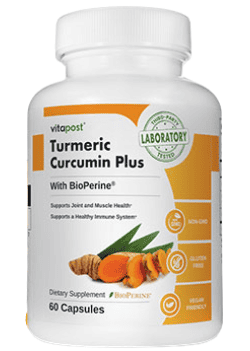
I'm talking about Turmeric Curcumin Plus:
- formula contains a 95% curcumin
- proven to relieve inflammatory-related pain and symptoms
- also contains a high-quality version of BioPerine (as an absorption booster)
- easy to take every day
- very low chances of causing adverse reactions
- price is worth it for its high-quality features
- proven and recommended by a lot of people who tried it
As I mentioned, Boswellia also helps in reducing inflammation.
But since it's not that easy to find, you can never go wrong choosing a turmeric supplement instead.
Again – it's easier to find and there are a lot of choices available.
So with that, I highly suggest that you try Turmeric Curcumin Plus.
That's because of its potent and safe formulation that's really designed to address inflammation.
My Verdict – Boswellia Or Turmeric?
Short answer: Turmeric – it's a lot better in terms of price and effect.
Boswellia surely has its own advantages and it's pretty close to turmeric.
That's why both herbs are pretty similar in several aspects:
- research
- clinical studies
- side effects
Again – Boswellia is not far from being the best.
However, people tend to gravitate more to turmeric, since it offers more choices.
But one thing you should consider in both herbs is the addition of an absorption enhancer.
That's because both of them have a poor bioavailability.
If you combine them with an absorption booster, you can get their full potential.
In most cases, you should be able to find a product that already incorporates an absorption booster.

It's my top recommendation for several reasons:
- potent formula that can relieve different types of joint pain
- very decent dose of turmeric (95% curcumin content)
- has BioPerine which can enhance the absorption of turmeric
- easy to take on a daily basis
- excellent price for its high qualities
Overall – it's up to your preference if you want to take Boswellia, turmeric or both.
Just be mindful of your body and consult your doctor if you have existing health conditions.
So in that way, you can avoid any potential adverse reactions.
References:
1 – https://www.sciencedirect.com/-topics/-boswellic-acid/
2 – https://www.sciencedirect.com/-science/-S0944711396800134/
3 – https://www.ncbi.nlm.nih.gov/-pmc/articles/-PMC5664031/
4 – https://pubmed.ncbi.nlm.nih.gov/-17569207/
5 – https://www.ncbi.nlm.nih.gov/-pmc/articles/-PMC7368679/
6 – https://www.sciencedirect.com/-topics/boswellia-serrata/-IBD/
7 – https://pubmed.ncbi.nlm.nih.gov/-27117114/
8 – https://pubmed.ncbi.nlm.nih.gov/-19918712/
9 – https://www.ncbi.nlm.nih.gov/-pmc/articles/-PMC3258268/
10 – https://www.ncbi.nlm.nih.gov/-pmc/articles/-PMC7770183/
11 – https://pubmed.ncbi.nlm.nih.gov/-33914984/
12 – https://pubmed.ncbi.nlm.nih.gov/-18398870/
13 – https://pubmed.ncbi.nlm.nih.gov/-19519446/
14 – https://www.ncbi.nlm.nih.gov/-pmc/articles/-PMC8004232/
15 – https://pubmed.ncbi.nlm.nih.gov/-27213821/
16 – https://www.ncbi.nlm.nih.gov/-pmc/articles/-PMC6770259/
17 – https://www.sciencedirect.com/-science/-S037887411100479X/
18 – https://www.frontiersin.org/-articles/10.3389/-fnut.2022.1040259/

